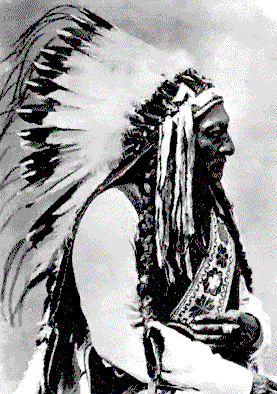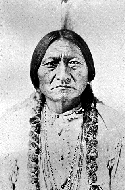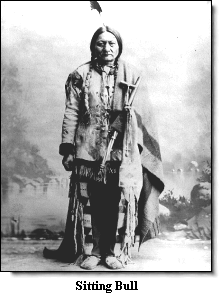Sitting Bull became a leader of the Strong Heart warrior society, and he successfully increased Sioux hunting grounds. However, the U.S. army continually invaded this territory, creating problems within the native economy. From 1863 to 1868, the Sioux fought the army's encroachment. In approximately 1867, Sitting Bull became the first principal chief of the entire Sioux nation. Shortly thereafter peace was made with the U.S. government, although Sitting Bull refused to attend the peace conference or sign the treaty. The Fort Laramie treaty promised the Black Hills would remain in Sioux possession forever.
 |
||
|
|
|
|
|
Researcher: Rachel Sahlman
Sitting Bull, whose Indian name was Tatanka
Iyotake, was born in the Grand River region of present-day South
Dakota in approximately 1831. His nickname was Hunkesi, meaning "Slow"
because he never hurried and did everything with care. Sitting Bull
was a member of the Sioux tribe, and he joined his first war party
against the Crow at age 14. The Sioux fought against hostile tribes
and white intruders. Soon, Sitting Bull became known for his
fearlessness in battle. He was also generous and wise, virtues admired
by his tribe.
However, in the mid-1870s, gold was discovered, and press reports brought a rush of prospectors. By 1875, more than a thousand prospectors were camping in the Black Hills. The government ordered the Sioux to their reservations. They were given a deadline of January 31, 1876, and anyone who did not comply was considered hostile. The demand was ignored by the Sioux and in March, General George Crook set up a camp in order to attack the natives. Sitting Bull and the Sioux realized they could not defeat the army alone, and they must stand with other tribes. They were joined by the Cheyenne and Arapaho, and on June 17, they forced a retreat of U.S. troops at the Battle of the Rosebud, then set up camp at Little Bighorn. After the battle, Sitting Bull performed an important religious ritual called a Sun Dance. The Sun Dance was a type of self-torture which included a loss of consciousness. When Sitting Bull emerged from his trance, he told of his vision of soldiers falling from the sky. Sitting Bull's prediction came true on June 25 when Lieutenant Colonel George Armstrong Custer led his soldiers into the village along the Little Big Horn River. By the end of the day, Custer and his army of more than 200 soldiers were dead. Sitting Bull thought by winning this battle, the U.S. government would leave him alone, but the fight had just begun. As the battles continued, many of Sitting Bull's followers surrendered. However, Sitting Bull would not give up. Soldiers chasing him found a note that read "You scare all the buffalo away. I want to hunt in this place. I want you to turn back from here. If you don't, I will fight you again."
In 1877, Sitting Bull and his followers
escaped into Canada. However within four years, famine forced them
to surrender. Sitting Bull was held as a prisoner of war for two
years, before he was sent to join other Sioux at Standing Rock
Agency in North Dakota. In 1885, Sitting Bull joined Buffalo
Bill's Wild West Show and traveled throughout the United States
and Canada. Some believe he was allowed to join the show to keep
him away from the reservation.
When Sitting Bull returned to the reservation in 1889, many natives had joined a new religion called the Ghost Dance. They believed an Indian messiah would return their lands and remove the whites. Because of this new religion, Indian police arrested Sitting Bull on December 15, 1890 as a precaution. They planned to send him to prison, but when his warriors attempted to rescue him, Sitting Bull was killed. He was buried at Fort Yates. In 1953, his remains were moved to Mobridge, South Dakota. Bibliographic Citation Format: Author's last name, first name, middle initial. "Title of biography." SPECTRUM Home & School Magazine. [http://www.incwell.com/Spectrum.html] (date accessed). © K. B. Shaw
-Tatanka Yotanka (Sitting Bull), Hunkpapa Lakota Sioux (1831-1890)
Sitting Bull Hunkpapa Sioux
Tatanka Yotanka (Sitting Bull)
Sitting Bulls Speech at the Powder River Council, 1877.
"Is it wrong for me to love my own? Is it wicked for me because my skin is red? Because I am Sioux? Because I was born where my father lived? Because I would die for my people and my country? God made me an Indian." Chief Sitting Bull
|



 We
want no white person or persons here. The Black Hills belong to me. If
the whites try to take them, I will fight. "If the Great Spirit had
desired me to be a white man he would have made me so in the first
place. He put in your heart certain wishes and plans, and in my heart
he put other and different desires. It is not necessary for eagles to
be crows."
We
want no white person or persons here. The Black Hills belong to me. If
the whites try to take them, I will fight. "If the Great Spirit had
desired me to be a white man he would have made me so in the first
place. He put in your heart certain wishes and plans, and in my heart
he put other and different desires. It is not necessary for eagles to
be crows."